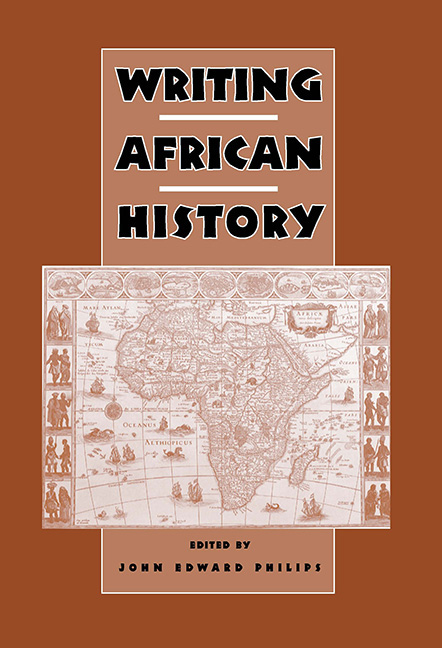Book contents
- Frontmatter
- Dedication
- Contents
- Acknowledgments
- Introduction
- Part I Background
- Part II Sources of Data
- Part III Perspectives on History
- 11 Data Collection and Interpretation in the Social History of Africa
- 12 African Economic History: Approaches to Research
- 13 Signs of Time, Shapes of Thought: The Contributions of Art History and Visual Culture to Historical Methods in Africa
- 14 Methodologies in Yorùbá Oral Historiography and Aesthetics
- 15 Local History in Post-Independent Africa
- 16 Africa and World-Systems Analysis: A Post-Nationalist Project?
- 17 “What Africa Has Given America”: African Continuities in the North American Diaspora
- 18 History and Memory
- 19 Writing About Women: Approaches to a Gendered Perspective in African History
- Part IV Conclusion
- Contributors
- Index
- Miscellaneous Endmatter
12 - African Economic History: Approaches to Research
from Part III - Perspectives on History
Published online by Cambridge University Press: 11 May 2017
- Frontmatter
- Dedication
- Contents
- Acknowledgments
- Introduction
- Part I Background
- Part II Sources of Data
- Part III Perspectives on History
- 11 Data Collection and Interpretation in the Social History of Africa
- 12 African Economic History: Approaches to Research
- 13 Signs of Time, Shapes of Thought: The Contributions of Art History and Visual Culture to Historical Methods in Africa
- 14 Methodologies in Yorùbá Oral Historiography and Aesthetics
- 15 Local History in Post-Independent Africa
- 16 Africa and World-Systems Analysis: A Post-Nationalist Project?
- 17 “What Africa Has Given America”: African Continuities in the North American Diaspora
- 18 History and Memory
- 19 Writing About Women: Approaches to a Gendered Perspective in African History
- Part IV Conclusion
- Contributors
- Index
- Miscellaneous Endmatter
Summary
I would like to take up four themes here that I think cover most of the recent African historiography, and which I believe would examine various African economic history subjects from different angles. Short discussions of each of these subjects will be made so that a student of African history could refer his or her subject of study to wider scholastic achievements that are available as books and journal articles. After such examination, I will take up the problems of how to search for evidence to support the expositions.
In doing this I must say that some rather important subjects had to be omitted, such as the ones dealing with predominantly early phase of economic life of hunter/gatherers or transmigrant livestock herders. These together with subsistence agriculture have been important economic activities of life sustenance. However, we should not assume the present state of agriculture in Africa to be predominantly subsistent in nature. An economic historian recently warned that “African agriculture is still described as ‘shifting’ and African economies characterized as ‘subsistence’ by many authors, despite persuasive critiques of these concepts by others.”
Under this theme, we can include various local trades such as trading done by primarily subsistence type of communities in commodities like salt and iron, which, due to the unavailability of the natural resources, the communities themselves could not produce. However, these are necessities and had to be obtained by barter or with money, or by other forms of transactions.
The major theme of precolonial trade in Africa is that of long-distance trade. This kind of trade in the first half of the second millennium (900–1500 c.e.) was so important that Catherine Coquery-Vidrovitch once called the long-distance trade the basic characteristic of “African Mode of Production.” The trans-Saharan caravan trade and its control by kingdoms established along the southern fringe of the Sahara Desert (the area called Sahel) is a subject of many economic as well as cultural historical studies. The examinations as to what were the material bases on which such kingdoms as ancient-Ghana, Mali, Songhai, Kanem/Bornu, and others flourished are still going on, and it is still debated whether the wealth of these kingdoms came from the direct control of gold trade, which was exchanged with salt and the Mediterranean goods, or by imposing tribute on the inhabitants of the subjected territories.
Importance of long-distant trade is not confined to the Sahelian area.
- Type
- Chapter
- Information
- Writing African History , pp. 308 - 328Publisher: Boydell & BrewerPrint publication year: 2005

